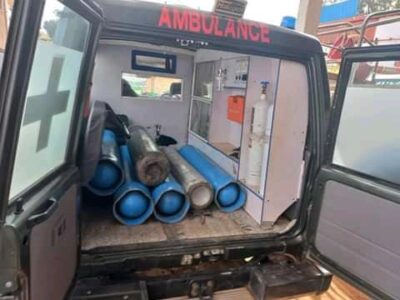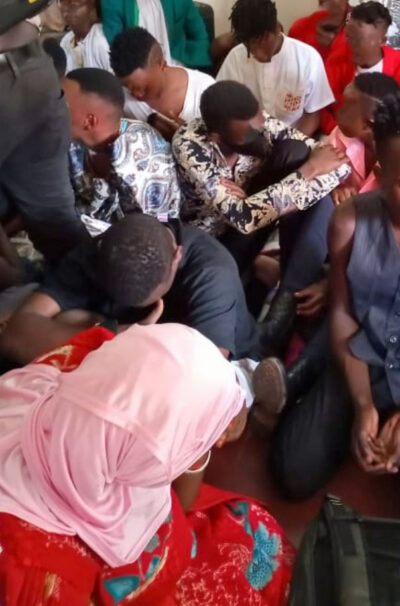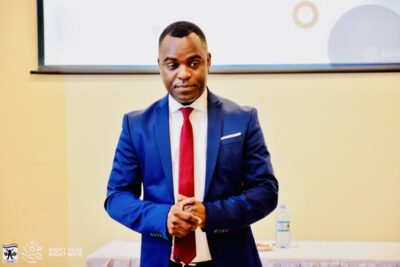Sexual Minorities Uganda (SMUG), the umbrella LGBTIQ+ entity in Uganda, wants its community members to protect themselves from Covid-19 by following anti-Covid Standard Operating Procedures (SOPs)m which will also make it hard for state agents to have an easy excuse to arbitrarily arrest community members under the pretext of Covid-19 regulations when the real motivation could be homophobia and transphobia.

An ambulance stockpiles oxygen cylinders for patients in Covid-19 intensive care beds. Uganda is currently experiencing a shortage of medical oxygen supplies. (Photo courtesy of Kakensa Media)
By Kikonyogo Kivumbi
SMUG sent its caution to LGBTIQ+ community members in a detailed violations report issued last week on the recent arrest and prosecution of members of the Happy Families LGBTIQ+ shelter.
The activists want all charges against those being prosecuted to be dropped.
Dr Frank Mugisha, the executive director of SMUG, who signed the report, said Uganda should respect homosexuals’ rights as contained in Resolution 275 of the African Commission on Human and People’s Rights, where Uganda is a member.
He was particularly alarmed that, during detention, a police surgeon ordered anal examinations on those arrested at the shelter. There was no privacy during the examinations, with curtains and windows open.
About the new Covid-19 lockdown

Arrestees at the Happy Family youth shelter were forced to sit on the floor. (Photo courtesy of Nile Post) (Arrestees’ faces are blurred for their safety.)
Uganda is in a new Covid-19 strict lockdown from June 6 that is set to last 42 days. It includes the closure of schools, open-market shutdowns, suspended church services, and some travel limits, according to Reuters. In the past, security forces and the police have been accused of arbitrary arrest and shaming LGBTIQ members during lock downs.
The country’s Covid-19 cases surge started a month ago and is also affecting younger people. In his June 6 address, President Yoweri Museveni called the outbreak “diffuse and sustained,” with fatality and critical illness levels that were greater than the country’s first wave. He also aired concerns that the surge would exhaust the country hospital capacity and oxygen supply.
Uganda has only 12 functional intensive care beds in the whole country for a population of 41 million people. There is an acute shortage of medical oxygen.
The stringent measures to control Covid-19 transmission were imposed after Uganda recorded over 1,000 new cases per day on June 2 – its highest tally ever, mostly among people aged between 20 and 39 years.
The 42-day lockdown, during which time all schools and institutions of higher learning will be closed, requires all teachers to be fully vaccinated before they are accepted back to the classrooms.
Since March, Uganda’s educational institutions have been a major source of Covid-19 infections with a total of 948 reported cases in 43 schools from 22 districts.
About the arrests of Happy Families members

SMUG Executive Director Frank Mugisha. (File photo)
On May 31, Uganda Police officers from Nansana Police Station in Nansana Municipal Council, Wakiso District, raided the Happy Families LGBTIQ+ shelter located in Nansana Municipal Council and arrested 44 individuals under the allegation that they were celebrating an illegal same- sex marriage ceremony. The 44 were detained at Nansana and Lubigi police stations overnight. Both police stations are located in Nansana Municipal Council.
The 44 were not officially accused in connect with a same-sex wedding but with Covid-19 violations — disobeying the Presidential Directives on the Prevention of Covid-19 under Section 171 of the Penal Code Act — a negligent act likely to spread infection. Of the 44 total, 42 of the LGBTIQ+ individuals were produced at the Nansana Magistrates Court in the evening of the following day. Of those, 39 were eventually remanded to Kitalya Maximum Security Prison in Wakiso District and detained there on the third day after the arrests.
Most of the individuals detained by police were denied police bond, leading to them being remanded. Hearing for bail was not held until June 8, which led to the individuals spending more time in detention.
Violations by the police and prisons authorities and effects of the arrests contained in the report
According to the SMUG report:
While in police custody and prison remand, the 39 (plus others who were released earlier) alleged that their rights were violated. These violations included forced anal examinations and HIV tests done on 17 of the arrested even though the charge was disobedience of the Penal Code Act related to acts likely to spread infection. These anal examinations were also done in open makeshift examination rooms without according any privacy to the suspects.
Police paraded the LGBTIQ+ suspects in front of the public and subjected them to forced video recordings and pictures which they then distributed on social media in a bid to publicly shame them.
The incarcerated arrestees were subjected to assault by other detainees under the direct instruction and watch of police officers and prison warders without these acts being stopped. One individual reported having been made to sleep in the toilet by prison inmates where he was almost allegedly raped at night.
Overcrowding in the prison and police detention rooms exposing the arrestees to the constant danger of Covid-19 and TB infection. They were also denied medication and treatment while in Kitalya Maximum Security Prison.
Four of the arrested LGBTIQ+ persons were below 18 years of age but were detained with adults in Kitalya. One was as young as 14 years of age. Some of the personal property belonging to the arrested were never returned after they left police cells and prison. These included money and phones among others.
The arresteeswere released on bail but suffer from serious mental effects of the violence of the arrests. Many are not sure of where to go next because they have been ostracized at home and cannot go back there. They need psychosocial counseling, medication, food, clothing and accommodation for the next few months at least.
Kikonyogo Kivumbi, the author of this article, is the executive director of the Uganda Health and Science Press Association. Contact him at [email protected].
COMMENTS